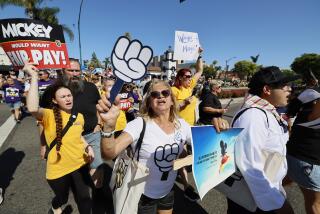Anti-Union Effort Pressed to Head Off NBA Vote
- Share via
NEW YORK — One-third of the NBA’s players went forward Thursday with their effort to decertify the union, the day before team owners and player representatives were to vote on a new labor agreement.
An attorney for Michael Jordan, Patrick Ewing, Scottie Pippen and other dissident players submitted to the National Labor Relations Board the names of more than 100 players wanting to decertify.
The union has 324 members, and at least 30% must ask the NLRB to hold a decertification election. The NLRB wouldn’t confirm the number of signatures submitted, and Jeffrey Kessler, who represents the players, would say only the number was “substantially above 100.”
Even if the six-year collective bargaining agreement is ratified today, it would be nullified if a majority of union members vote to decertify. An election would have to be called by the NLRB, not likely to happen until August, said NLRB regional director Dan Silverman.
With that threat looming, the league and the union spent the day trying to sell the agreement to their constituents.
Union leaders were not only confident the deal would be approved, they also believed its passage would show a decertification election would fail. However, Kessler predicted the ranks of players wanting to decertify would surpass 50% by today.
The owners were to meet this morning in New York, and players were to gather this afternoon at a hotel outside Chicago.
Union president Buck Williams of the Portland Trail Blazers said all players were invited to the meeting, and he expected a significant number of rank-and-file members--in addition to the player representatives--to attend.
Simon Gourdine, the union’s executive director, said it’s possible the ratification could be delayed if enough players don’t feel prepared to vote.
Commissioner David Stern said some owners aren’t entirely happy, either, citing the end of restricted free agency and a team’s right of first refusal, the elimination of the second round of the college draft and loss of licensing revenues.
More to Read
Go beyond the scoreboard
Get the latest on L.A.'s teams in the daily Sports Report newsletter.
You may occasionally receive promotional content from the Los Angeles Times.










